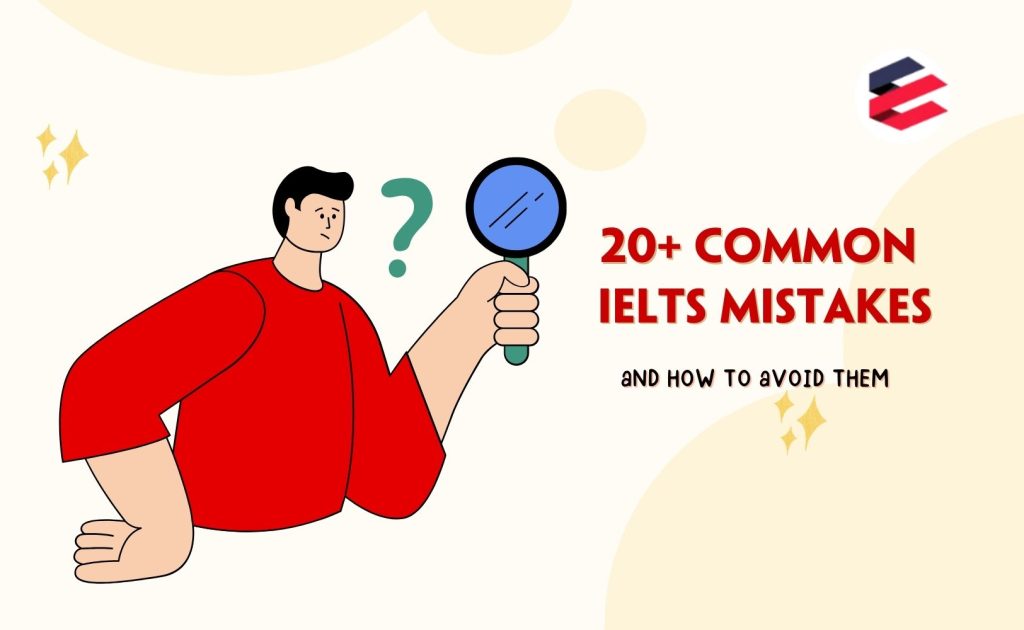20+ Common IELTS Mistakes and How to Avoid Them
The IELTS (International English Language Testing System) exam is a crucial step for many individuals seeking to study, work, or live in English-speaking countries. To achieve a high band score, avoiding common IELTS mistakes is essential. To help you achieve a high band score, IELTS-Testpro has analyzed the most frequent errors candidates make. Avoiding these common pitfalls is essential. In this article, we highlight 20+ frequent errors candidates make across all four sections—Listening, Reading, Writing, and Speaking.

I. Common Mistakes in IELTS Listening
The lELTS Listening section assesses your ability to understand spoken English in a variety of contexts. It’s crucial to pay close attention and develop effective listening strategies to avoid common IELTS mistakes in listening.

1. Ignoring the instructions given
- Mistake: Writing more words than allowed (e.g., writing three words when the instruction says “no more than two words”).
- How to avoid: Carefully read and follow the instructions for each section.
2. Repeating the same word or phrase
- Mistake: Focusing on verbatim keywords instead of understanding the meaning of paraphrased information. The speaker may not use the exact words you are looking for.
- How to avoid: Practice listening for synonyms and related phrases instead of directly matching the words from the question.
3. Not Watching Out for Distractors
- Mistake: Being misled by words or phrases that sound correct but ultimately provide incorrect information.
- How to avoid: Listen carefully to the entire sentence or context before finalizing your answer. Be aware that speakers may use “distractors” to test your comprehension.
Tip: Distractors are intentionally included to test active listening. The first answer you hear (especially for dates, times, or prices) is often the incorrect one.
3. Spelling Errors
- Mistake: Making common spelling errors in IELTS listening, even if you know the correct word (e.g., writing “recieve” instead of “receive”). This can also be prevalent with names, places, and less common vocabulary.
- How to avoid: Pay close attention to pronunciation and practice spelling frequently with online tools and dictionaries to avoid common spelling errors in IELTS listening.
4. Forgetting to transfer answers
- Mistake: Completing the listening section but failing to transfer your answers to the answer sheet within the allocated time.
- How to avoid: Use the time provided at the end of each section to transfer your answers carefully.
II. Common Mistakes in IELTS Reading
The IELTS Reading section assesses your ability to understand written English texts and identifies common IELTS mistakes. It’s not about testing your general knowledge but rather your ability to locate and comprehend specific information.

1. Not Reading the Instructions Carefully
- Mistake: Misunderstanding the question type and its requirements, leading to incorrect answers.
- How to avoid: Always read the instructions carefully and understand what is being asked. Pay attention to word limits and specific requirements.
2. Spending Too Much Time on One Question
- Mistake: Getting stuck on a difficult question and wasting valuable time, leaving less time for other questions.
- How to avoid: If you’re struggling with a question, skip it and come back to it later. Effective time management is crucial.
3. Relying on Prior Knowledge
- Mistake: Attempting to answer questions based on personal knowledge instead of the information provided in the passage.
- How to avoid: Always base your answers solely on the information provided in the text.
Remember: The ‘Not Given’ option is a test of your ability to understand the limits of the text. If you can’t find the information, don’t use your own knowledge to guess ‘True’ or ‘False’.
4. Guessing Without Locating Key Information
- Mistake: Answering questions without properly locating the relevant information in the passage, leading to inaccurate answers.
- How to avoid: Use skimming and scanning techniques to locate keywords and paraphrases in the text before attempting to answer the questions.
5. Not Practicing with Actual Tests
- Mistake: Only studying grammar rules or vocabulary lists without applying them to real IELTS reading passages, leaving you unprepared.
- How to avoid: Regularly practice with authentic IELTS reading tests, including full-length practice tests.
III. Common Mistakes in IELTS Speaking
The IELTS Speaking section assesses your fluency, vocabulary, grammar, and pronunciation. It is essential to overcome the common IELTS mistakes in this section to achieving a higher band score.

1. Using Memorized Responses
- Mistake: Reciting pre-prepared answers instead of engaging in natural conversation. Examiners can easily detect memorized responses, which can negatively impact your score.
- How to avoid: Focus on understanding the types of questions asked and practicing responding naturally and spontaneously.
Note: When a candidate uses a memorized answer, the examiner cannot assess their ability to produce spontaneous language. This often leads to a lower score for ‘Fluency and Coherence’ because the response sounds unnatural and robotic.
2. Going Off Topic
- Mistake: Drifting away from the question being asked and discussing unrelated subjects, demonstrating poor focus and confusing the examiner.
- How to avoid: Listen carefully to the question and ensure your answer directly addresses it. If you realize you’ve gone off-topic, gently steer your response back to the original question.
3. Ignoring Grammatical Errors
- Mistake: Making frequent grammatical errors that hinder communication.
- How to avoid: Focus on using correct grammar structures and tenses. Record yourself speaking and identify areas where you need improvement.
4. Not Expanding on Answers
- Mistake: Providing short, unelaborated answers that don’t demonstrate your English proficiency.
- How to avoid: Add details, examples, and personal experiences to expand on your answers and showcase your vocabulary and grammar skills.
5. Mispronouncing Words
- Mistake: Mispronouncing common words, which can impact the clarity of your answers.
- How to avoid: Practice pronunciation regularly, focusing on problematic sounds with the help of online resources and language learning apps.
IV. Common Mistakes in IELTS Writing
The IELTS Writing section assesses your ability to write clear, coherent, and well-organized essays and reports. Recognizing and correcting common IELTS mistakes in writing is crucial for achieving a good score.

1. Not Understanding the Question
- Mistake: Misinterpreting the question prompt, leading to an off-topic or irrelevant response.
- How to avoid: Carefully read and analyze the question to fully understand what is being asked.
2. Including Personal opinion
- Mistake: Giving opinions without supporting them with evidence. IELTS writing needs objective analysis, not just personal feelings.
- How to avoid: Back up your ideas with facts, examples, and logical reasons. Avoid saying “I think” or “In my opinion” unless the question specifically asks for your personal view.
3. Forcing Vocabulary
- Mistake: Using overly complex or obscure vocabulary unnaturally or inappropriately, making the writing sound forced and unnatural.
- How to avoid: Use vocabulary that you are comfortable with and that fits naturally within the context of your writing.
4. Ignoring Word Count
- Mistake: Writing below or above the required word count, which can negatively affect your score.
- How to avoid: Keep track of your word count as you write and ensure you meet the requirements.
5. Making Grammatical Errors
- Mistake: Making frequent grammatical mistakes in writing that detract from the clarity and accuracy of your writing.
- How to avoid: Proofread your essay carefully for grammatical errors before submitting it.
V. How to Avoid Common IELTS Mistakes
To maximize your chances of getting a high overall score, it’s essential to address these common IELTS mistakes proactively. Here are some general tips:

- Understand the Test Format: Familiarize yourself with the structure and requirements of each section of the IELTS test.
- Manage Your Time Wisely: Practice time management techniques to ensure you can complete each section within the allocated time.
- Practice Accurate Spelling & Grammar: Focus on improving your spelling and grammar rules to avoid common spelling mistakes in IELTS Listening.
- Avoid Memorized Answers: Respond to questions naturally and spontaneously, rather than relying on pre-prepared answers.
- Practice Under Exam Conditions: Simulate the exam environment by taking full-length practice tests under timed conditions.
In conclusion, understanding and avoiding common IELTS mistakes can greatly improve your performance. To practice effectively based on this expert advice and ensure you’re fully prepared for exam day, try IELTS Test Pro’s realistic IELTS online tests.